一般现在时的被动语态
- 格式:docx
- 大小:2.46 MB
- 文档页数:3
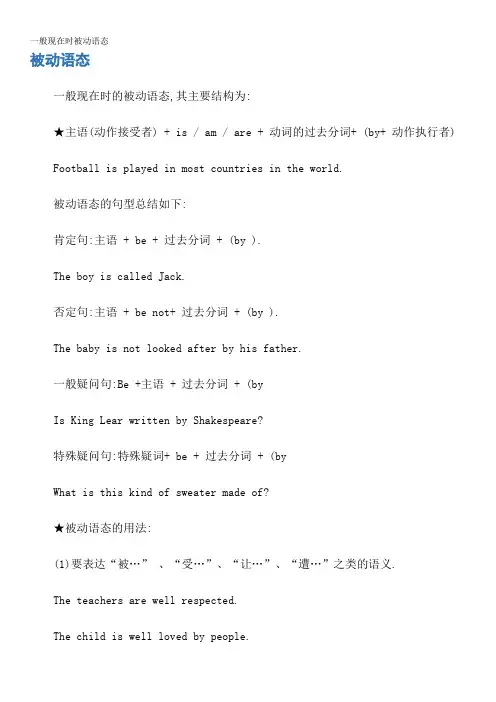
被动语态一般现在时的被动语态,其主要结构为:★主语(动作接受者) + is / am / are + 动词的过去分词+ (by+ 动作执行者) Football is played in most countries in the world.被动语态的句型总结如下:肯定句:主语 + be + 过去分词 + (by ).The boy is called Jack.否定句:主语 + be not+ 过去分词 + (by ).The baby is not looked after by his father.一般疑问句:Be +主语 + 过去分词 + (byIs King Lear written by Shakespeare?特殊疑问句:特殊疑词+ be + 过去分词 + (byWhat is this kind of sweater made of?★被动语态的用法:(1)要表达“被…” 、“受…”、“让…”、“遭…”之类的语义.The teachers are well respected.The child is well loved by people.(2)强调动作承受者.He is known far and wide.他远近闻名.(3)不知道式没有必要指出动作的执行者.The room is cleaned every day.房子每天都有人打扫.(4)为礼貌起见避免提及动作执行者.I wonder if I was allowed to introduce myself?我是否可以做自我介绍?【练习】I.选择1. The streets ______ many times every day.A. cleanB. cleansC. cleanedD. are cleaned2. The music is very loud and it can ______ from a long way away.A. be heardB. is heardC. hearD. heard3. Mr. Smith has a loud voice. His voice can ______ clearly even in that big classroom.A. hearB. be heardC. be hearingD. have heard4. —Now computers ______ everywhere.—I agree with you. I think they are the most useful inventions in the world.A. are usingB. useC. are usedD. will use5.The whole China ______ to tears by Cairen Danzhou(才仁旦舟), the youngest volunteer and hero in Yushu,Qinghai Province.A. moveB. movesC. is movingD. is moved6. It is true that knowledge ______ instead of being taught. A. learns B. learned C. is learned D. was learned7. These photos ______ on the Great Wall last week.A. were takenB. tookC. takeD. are taken8. —Can you read this letter for me?—Sorry. It ______ in French. I can’t read it.A. writesB. wroteC. is writtenD. is writing9. Our school ______ 20 years ago.A. built B. builds C. is built D. was built10. A talk on the history of the Great Wall ______ in the school hall next week.A. givesB. gaveC. will be givenD. is givenII.用括号中所给动词的适当形式填空。
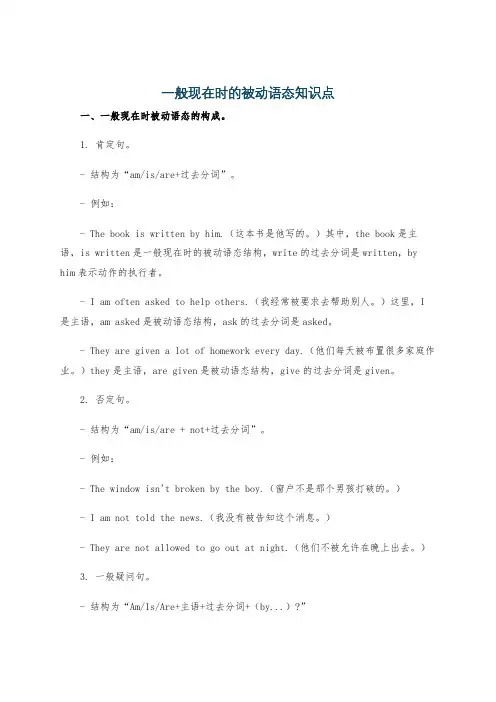
一般现在时的被动语态知识点一、一般现在时被动语态的构成。
1. 肯定句。
- 结构为“am/is/are+过去分词”。
- 例如:- The book is written by him.(这本书是他写的。
)其中,the book是主语,is written是一般现在时的被动语态结构,write的过去分词是written,by him表示动作的执行者。
- I am often asked to help others.(我经常被要求去帮助别人。
)这里,I 是主语,am asked是被动语态结构,ask的过去分词是asked。
- They are given a lot of homework every day.(他们每天被布置很多家庭作业。
)they是主语,are given是被动语态结构,give的过去分词是given。
2. 否定句。
- 结构为“am/is/are + not+过去分词”。
- 例如:- The window isn't broken by the boy.(窗户不是那个男孩打破的。
)- I am not told the news.(我没有被告知这个消息。
)- They are not allowed to go out at night.(他们不被允许在晚上出去。
)3. 一般疑问句。
- 结构为“Am/Is/Are+主语+过去分词+(by...)?”- 例如:- Is the letter sent by her?(这封信是她寄的吗?)- Are you often invited to the party?(你经常被邀请参加聚会吗?)- Am I given a chance?(我被给予一个机会吗?)4. 特殊疑问句。
- 结构为“特殊疑问词+am/is/are+主语+过去分词+(by...)?”- 例如:- What is made in this factory?(这个工厂生产什么?)- Who are you taught by?(谁教你们?)- How is the work done?(这项工作是如何完成的?)二、一般现在时被动语态的用法。
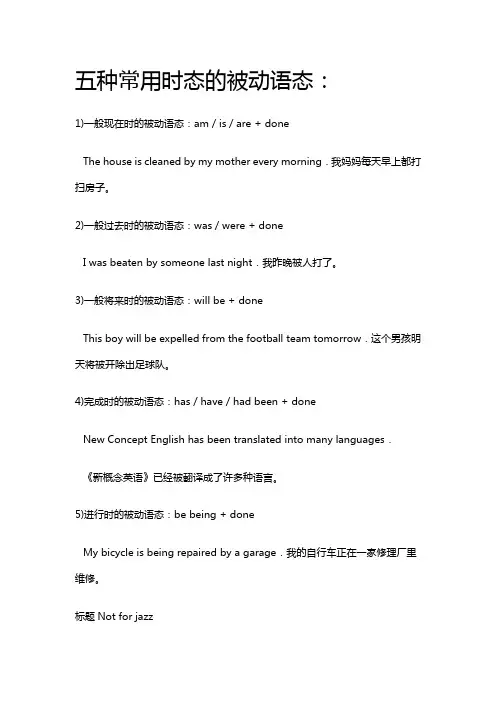
五种常用时态的被动语态:1)一般现在时的被动语态:am/is/are + doneThe house is cleaned by my mother every morning.我妈妈每天早上都打扫房子。
2)一般过去时的被动语态:was/were + doneI was beaten by someone last night.我昨晚被人打了。
3)一般将来时的被动语态:will be + doneThis boy will be expelled from the football team tomorrow.这个男孩明天将被开除出足球队。
4)完成时的被动语态:has/have/had been + doneNew Concept English has been translated into many languages.《新概念英语》已经被翻译成了许多种语言。
5)进行时的被动语态:be being + doneMy bicycle is being repaired by a garage.我的自行车正在一家修理厂里维修。
标题Not for jazz总结for的用法:1)为:I bought a book for you.我为你买了一本书。
2)因为:Something fell in,for I heard a splash.一定有东西掉下去了,因为我听见扑通一声。
4)适合:Not for jazz=It's not suitable to play jazz on the clavichord.古钢琴不适合演奏爵士乐。
Question:What happened to the clavichord?to后面加宾语,表示其身上发生了什么事,即动作的目标、对象。
What happened to you?你怎么了?(在你身上发生了什么事?)(1)否定句与疑问句的被动语态We don’t believe her.我们不信她的话。

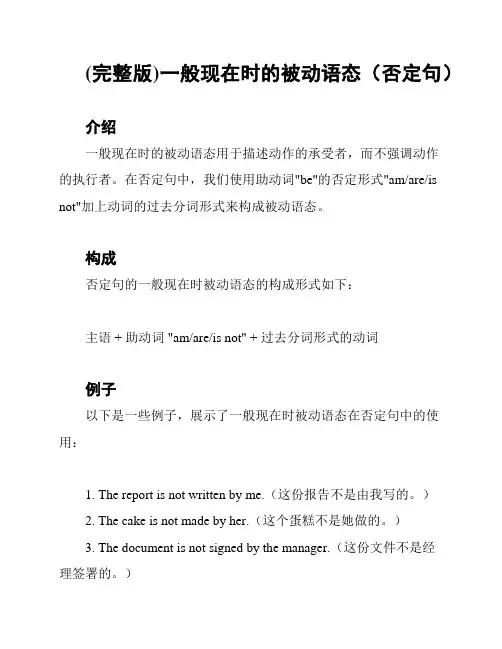
(完整版)一般现在时的被动语态(否定句)
介绍
一般现在时的被动语态用于描述动作的承受者,而不强调动作
的执行者。
在否定句中,我们使用助动词"be"的否定形式"am/are/is not"加上动词的过去分词形式来构成被动语态。
构成
否定句的一般现在时被动语态的构成形式如下:
主语 + 助动词 "am/are/is not" + 过去分词形式的动词
例子
以下是一些例子,展示了一般现在时被动语态在否定句中的使用:
1. The report is not written by me.(这份报告不是由我写的。
)
2. The cake is not made by her.(这个蛋糕不是她做的。
)
3. The document is not signed by the manager.(这份文件不是经
理签署的。
)
4. The problem is not solved by the team.(这个问题不是团队解决的。
)
注意事项
在一般现在时的被动语态中,动词的过去分词形式不随主语的单复数而变化。
助动词"be"的形式根据主语的单复数以及第三人称的情况而定。
总结
一般现在时的被动语态在否定句中的构成形式为主语 + 助动词"am/are/is not" + 过去分词形式的动词。
使用被动语态可以突出动作的承受者,而不是执行者。
在使用时要注意不同主语的单复数和第三人称的变化。
以上是对一般现在时的被动语态在否定句中的简要介绍。

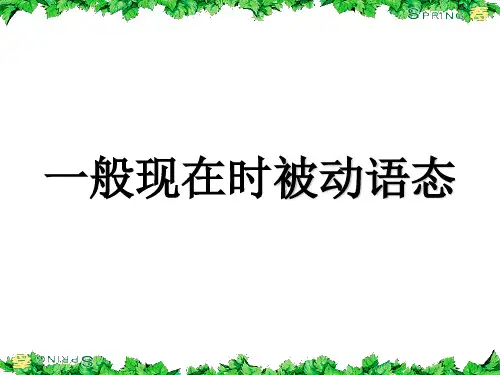
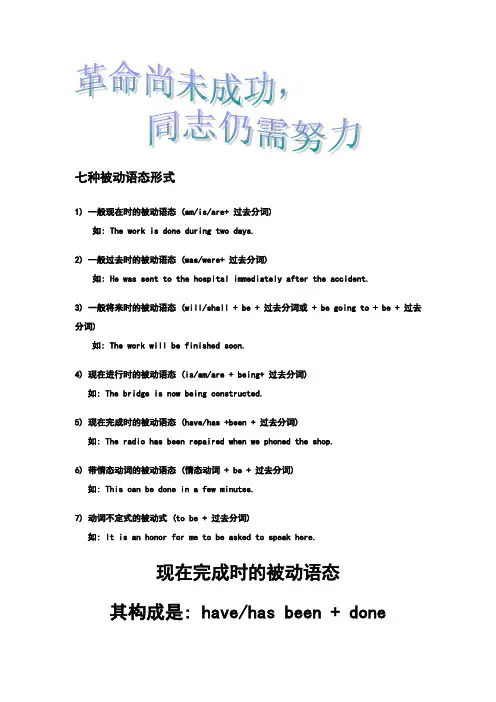
七种被动语态形式1) 一般现在时的被动语态 (am/is/are+ 过去分词)如: The work is done during two days.2) 一般过去时的被动语态 (was/were+ 过去分词)如: He was sent to the hospital immediately after the accident.3) 一般将来时的被动语态 (will/shall + be + 过去分词或 + be going to + be + 过去分词)如: The work will be finished soon.4) 现在进行时的被动语态 (is/am/are + being+ 过去分词)如: The bridge is now being constructed.5) 现在完成时的被动语态 (have/has +been + 过去分词)如: The radio has been repaired when we phoned the shop.6) 带情态动词的被动语态 (情态动词 + be + 过去分词)如: This can be done in a few minutes.7) 动词不定式的被动式 (to be + 过去分词)如: It is an honor for me to be asked to speak here.现在完成时的被动语态其构成是: have/has been + done现在完成时的被动语态表示动作发生在过去, 到现在已经完成或对现在仍有影响,。
如:1. The dirty clothes have been washed.脏衣服都已经洗了。
2. The plan has been studied by the experts for three times.这项计划已经由专家研究过三次了。
现在完成时:表示从过去持续到现在,还可能继续持续下去的动作,往往和表示一段时间的状语(for+一段时间, since…, )等连用,或用于how long 句型中1. 主语是行为动作的承受者。
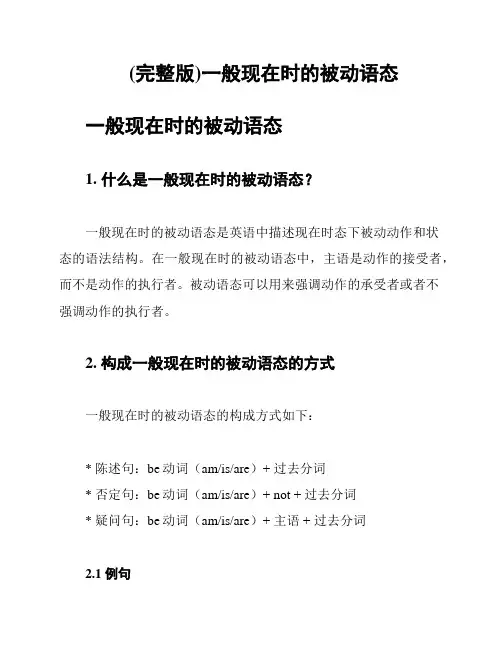
(完整版)一般现在时的被动语态一般现在时的被动语态1. 什么是一般现在时的被动语态?一般现在时的被动语态是英语中描述现在时态下被动动作和状态的语法结构。
在一般现在时的被动语态中,主语是动作的接受者,而不是动作的执行者。
被动语态可以用来强调动作的承受者或者不强调动作的执行者。
2. 构成一般现在时的被动语态的方式一般现在时的被动语态的构成方式如下:* 陈述句:be动词(am/is/are)+ 过去分词* 否定句:be动词(am/is/are)+ not + 过去分词* 疑问句:be动词(am/is/are)+ 主语 + 过去分词2.1 例句以下是一些例句,用于演示一般现在时的被动语态的构成方式:* The book is read by students.(被学生们阅读。
)* The food is cooked by the chef.(被厨师烹饪。
)* The report is written by Jane.(被简写的报道。
)2.2 第三人称单数的被动语态在一般现在时的被动语态中,如果主语是第三人称单数,则需要使用动词的第三人称单数形式,并加上be动词(is/are)。
例如:* The letter is sent by him.(被他寄出。
)* The car is driven by John.(被约翰开车。
)2.3 直陈疑问句和否定句的变化直陈疑问句和否定句在一般现在时的被动语态中的变化如下:* 直陈疑问句:把be动词(am/is/are)提前到句子开头。
* Are the books read by students?(书是被学生读的吗?)* Is the food cooked by the chef?(食物是被厨师烹饪的吗?)* 否定句:在be动词后加上not。
* The book is not read by students.(书不是被学生读的。
)* The food is not cooked by the chef.(食物不是被厨师烹饪的。

各种时态的被动语态一、八大时态的被动语态的构成:1.一般现在时的被动语态构成:(am/is/are +done)如:I am asked to study hard. 我被请求努力学习。
This shirt is washed once a week. 这件T恤一周洗一次。
These songs are usually sung by boys. 这些歌曲通常是男生唱的。
2.一般过去时的被动语态构成:(was/were done)如:The soldier was killed, but the train was saved. 这位战士牺牲了,然而列车得救了。
Some notes were passed up to the speaker. 有人给讲演者递上来一些纸条。
3.一般将来时的被动语态构成:(shall/will be done)如:We shall be asked a lot of strange questions. 我们将被问许多怪题。
My son will be sent to school next September. 来年九月我将送我儿子去读书。
4.过去将来时的被动语态构成:(should/would be done)如:The news would be sent to him as soon as it arrived. 消息一到就会转给他的。
He told us that the new railway would be built the next year. 他告诉我新铁路将在明年修建。
5.现在完成时的被动语态构成:(has/have been done)如:The work has just been finished. 工作刚刚结束。
The old rules have been done away with by us. 旧规章已经被我们废除了。
6.过去完成时的被动语态构成:(had been done)如:By last December three ships had been built by them. 到去年十二月底他们已建造了三艘船。
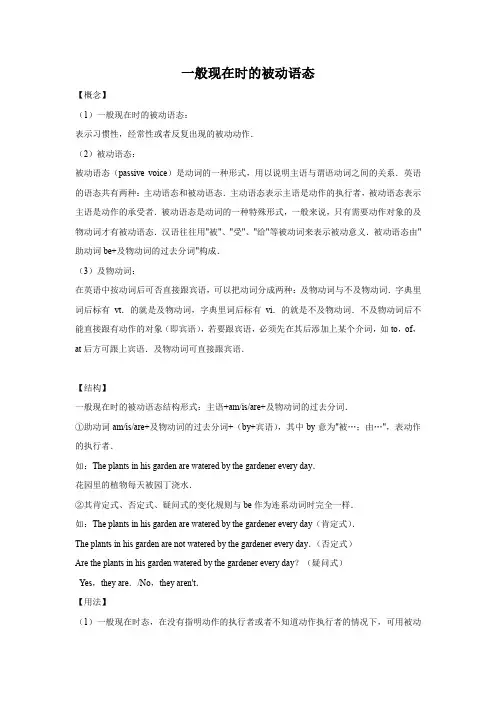
一般现在时的被动语态【概念】(1)一般现在时的被动语态:表示习惯性,经常性或者反复出现的被动动作.(2)被动语态:被动语态(passive voice)是动词的一种形式,用以说明主语与谓语动词之间的关系.英语的语态共有两种:主动语态和被动语态.主动语态表示主语是动作的执行者,被动语态表示主语是动作的承受者.被动语态是动词的一种特殊形式,一般来说,只有需要动作对象的及物动词才有被动语态.汉语往往用"被"、"受"、"给"等被动词来表示被动意义.被动语态由"助动词be+及物动词的过去分词"构成.(3)及物动词:在英语中按动词后可否直接跟宾语,可以把动词分成两种:及物动词与不及物动词.字典里词后标有vt.的就是及物动词,字典里词后标有vi.的就是不及物动词.不及物动词后不能直接跟有动作的对象(即宾语),若要跟宾语,必须先在其后添加上某个介词,如to,of,at后方可跟上宾语.及物动词可直接跟宾语.【结构】一般现在时的被动语态结构形式:主语+am/is/are+及物动词的过去分词.①助动词am/is/are+及物动词的过去分词+(by+宾语),其中by意为"被…;由…",表动作的执行者.如:The plants in his garden are watered by the gardener every day.花园里的植物每天被园丁浇水.②其肯定式、否定式、疑问式的变化规则与be作为连系动词时完全一样.如:The plants in his garden are watered by the gardener every day(肯定式).The plants in his garden are not watered by the gardener every day.(否定式)Are the plants in his garden watered by the gardener every day?(疑问式)Yes,they are./No,they aren't.【用法】(1)一般现在时态,在没有指明动作的执行者或者不知道动作执行者的情况下,可用被动。
被动语态英语中及物动词有两种语态,即主动语态和被动语态。
主动语态表示主语是动作的执行者被动语态表示主语是动作的承受者。
被动语态由“助动词be+及物动词的过去分词”构成。
助动词be有人称、时态和数的变化。
一、被动语态的用法:1.一般现在时的被动语态构成:is / am / are + 及物动词的过去分词Our classroom is cleaned everyday.I am asked to study hard.2.一般过去时的被动语态构成:was / were + 及物动词的过去分词A new shop was built last year.4.一般将来时的被动语态构成:will+ be + 及物动词的过去分词A new hospital will be built in our city.5.含有情态动词的被动语态构成:情态动词+ be + 及物动词的过去分词Young trees must be watered often.Your mistakes should be corrected right now.6.现在进行时的被动语态构成:am / is / are + being + 及物动词的过去分词My bike is being repaired by Tom now.Trees are being planted over there by them.7.不定式的被动语态:to + be + 及物动词的过去分词There are two books to be read. →There are twenty more trees to be planted.三、使用被动语态应注意的几个问题:1.不及物动词无被动语态。
The dinosaurs disappeared about 65 million years ago.2.有些动词用主动形式表示被动意义。
This pen writes well. This new book sells well.3.感官动词或使役动词使用省略to的动词不定式,主动语态中不带to ,但变为被动语态时,须加上to 。
一般现在时和一般将来时的被动语态结构一、被动语态:含义:语态是动词的一种形式,用以说明主语与谓语动词之间的关系。
英语的语态共有两种:主动语态和被动语态。
主动语态表示主语是动作的执行者,被动语态表示主语是动作的承受者。
被动语态是动词的一种特殊形式,一般说来,只有需要动作对象的及物动词才有被动语态。
汉语往往用"被”、"受"、"给"等词来表示被动意义。
如: He openedthe door.他打开了这扇门。
(主动语态)The door was opened.这扇门被打开了。
(被动语态)Many people speak English.(主动语态,句子的主语many people是动作speak的执行者)English is spoken by many people.(被动语态,句子的主语English是动作speak的承受者)基本结构:主语+ be + done(及物动词的过去分词) +(by...).其中be 有时态、人称和数的变化,被动语态的时态是由be 的时态决定的,be 是什么时态,全句就是什么时态,be 动词后面的过去分过去分词部分不变。
一起来了解一般现在时和一般将来时的被动语态。
二、一般现在时和一般将来时的被动语态结构1.一般现在时被动语态结构:肯定句:主+is/am/are +及物动词过去分词+其他.否定句:主+is/am/are+not +及物动词过去分词+其他一般疑问句:ls/Am/Are +主+及物动词过去分词+其他?特殊疑问句:特殊疑问词+is/am/are +主及物动词过去分词+其他?如:English is taught in most schools.大多数学校都教英语。
The children are not allowed to play on the grass.孩子们不允许在草地上玩耍。
Is a recorder used in our English class every day?英语课每天用录音机吗?2.一般将来时的被动语态结构:如:A talk will be given soon.很快要作报告。
一般现在时的被动语态句子30个一、介绍被动语态是英语中常用的语法结构之一,它用于强调动作的承受者或者主语的无力行为。
在一般现在时的被动语态句子中,谓语动词使用一般现在时的被动形式,即be动词(am/is/are)加上过去分词。
下面列举了30个符合要求的一般现在时的被动语态句子。
二、正文1. Our house is cleaned every week by a professional cleaner.每周我们的房子都会被专业的清洁工打扫。
2. The meeting is held in the conference room every Monday.会议每周一在会议室举行。
3. The book is read by millions of people around the world.这本书被全球数百万人阅读。
4. The window is opened by my father every morning.窗户每天早上都会被我爸爸打开。
5. The letter is written by my younger sister.这封信是我妹妹写的。
6. The car is washed every week by a professional car washer.这辆车每周都会被专业的洗车工洗净。
7. English is spoken by many people as a second language.英语作为第二语言被很多人使用。
8. The cake is baked by my grandmother.这个蛋糕是我奶奶烤的。
9. The news is broadcasted on TV every evening.这个消息每天晚上都会在电视上播报。
10. The report is prepared by our team.这份报告是我们团队准备的。
11. The flowers are watered every morning by the gardener.花园里的花每天早上都会被园丁浇水。
被动语态一般现在时的被动语态,其主要结构为:★主语动作接受者+ is / am / are + 动词的过去分词+ by+ 动作执行者Football is played in most countries in the world.被动语态的句型总结如下:肯定句:主语+ be + 过去分词+ by .The boy is called Jack.否定句:主语+ be not+ 过去分词+ by .The baby is not looked after by his father.一般疑问句:Be +主语+ 过去分词+ byIs King Lear written by Shakespeare特殊疑问句:特殊疑词+ be + 过去分词+ byWhat is this kind of sweater made of★被动语态的用法:1要表达“被…” 、“受…”、“让…”、“遭…”之类的语义.The teachers are well respected.The child is well loved by people.2强调动作承受者.He is known far and wide.他远近闻名.3不知道式没有必要指出动作的执行者.The room is cleaned every day.房子每天都有人打扫.4为礼貌起见避免提及动作执行者.I wonder if I was allowed to introduce myself我是否可以做自我介绍练习I.选择1. The streets ______ many times every day.A. cleanB. cleansC. cleanedD. are cleaned2. The music is very loud and it can ______ from a long way away.A. be heardB. is heardC. hearD. heard3. Mr. Smith has a loud voice. His voice can ______ clearly even in that big classroom.A. hearB. be heardC. be hearingD. have heard4. —Now computers ______ everywhere.—I agree with you. I think they are the most useful inventions in the world.A. are usingB. useC. are usedD. will use5.The whole China ______ to tears by Cairen Danzhou才仁旦舟, the youngest volunteer and hero in Yushu,Qinghai Province.A. moveB. movesC. is movingD. is moved6. It is true that knowledge ______ instead of being taught. A. learns B. learned C. is learned D. was learned7. These photos ______ on the Great Wall last week.A. were takenB. tookC. takeD. are taken8. —Can you read this letter for me —Sorry. It ______ in French. I can’t read it.A. writesB. wroteC. is writtenD. is writing9. Our school ______ 20 years ago. A. built B. builds C. is built D. was built10. A talk on the history of the Great Wall ______ in the school hall next week.A. givesB. gaveC. will be givenD. is givenII.用括号中所给动词的适当形式填空;1. Usually computers __________________use to get information on the Internet.2. I _________________ask to clean my bedroom every day by my mother.3. Trees ___________________ plant in spring.4. ---How clean and tidy your bedroom is---Thank you. It _________________clean every day.5. As China grows stronger and stronger , Chinese ________________teach in more and more schools out of our country.6. A book ___________________ give to me by my mother on my birthday.__________________say that Slumdog Millionaire贫民窟的百万富翁is a good film. 巩固练习一.把主动语态变成被动语态;cleans the room every Sunday. grow rice in the south .in England speak English play football on the playground every afternoon. you often watch TV at home in the evening doesn’t finish her homework don’t read that book.do they watch basketball match every week does Tom study do you listen to music二.把被动语态变成主动语态;are used for locking .weis played .the studentsare made of wood .workersisn’t had in the classroom.the teacherthis book read every dayare bikes made theyis done Lucythe pens made in the factoryyouisn’t spoken by people in China.are given some money they.。
一般现在时的被动语
态
Revised on November 25, 2020
一般现在时的被动语态:
承受者+be{is/am/are +done(过去分词) by+执行者 .
.: Many schools are built(done) every year in the city.
note: {地点状语,时间状语一般都放在句末;in the city 特指
其中 be 的使用取决于主语的单复形式。
A lot of修饰可数和不可数名词
Many修饰可数名词转自环球网校
Mach修饰不可数名词
主动: They all read(原形) English every day.
被动:English read (过去分词)by all of them every day.
主动:Mother often scolds me.
被动:I am often scolded by mother. 一般过去式的被动语态:
承受者+be{was/were +done(过去分词) by+执行者 (不明确可省略)。
.:主动:He repaired his bike yesterday.
被动:His bike was repaired by him yesterday.
主动:Children cleaned many streets last Sunday.
被动:Many streets were cleaned by children last Sunday. 现在进行时的被动语态:
承受者+be{is/am/are being(现在分词)done by+执行者 (不明确可省略)。
. 主动: He is writing his composition.
被动:His composition is being written by him.
Note: write/wrote/wtitten
过去进行时的被动语态:
承受者+be{was/were} being(现在分词)done by+执行者 (不明确可省略)。
. 主动:He was majoring computer during his college.
被动:Computer was being majored by him during his college. 将来
时的被动语态:
承受者+{be going to/will/shall(be动词原形)/be to}be done by+执
行者 (不明确时可省略)。
A big supermarket will/shall/be to be built here next year
Note : be to :计划或安排好的动作或行为。
The flight is to leave for Hefei city.
6. 现在完成时的被动语态:
承受者+have(复数主语)/has been done by+执行者 (不明确可省略)
. 主动:Our School has finished many scientific researches.
被动:Many scientific researches have been finished by our school.
7. 将来时态的被动语态:转自环球网校
承受者+{be going to/will/shall/be to}have been done by+执行者
. 主动:We‘ ll have finished the book by the end of September.
被动: The book will/shall have been finished by the end of September
Note: by the end of 短语的用法
(1) Will have done by the end of +将来时态
(2) Had done by the end of +过去完成时态
. The project had been made by the end of last week.。